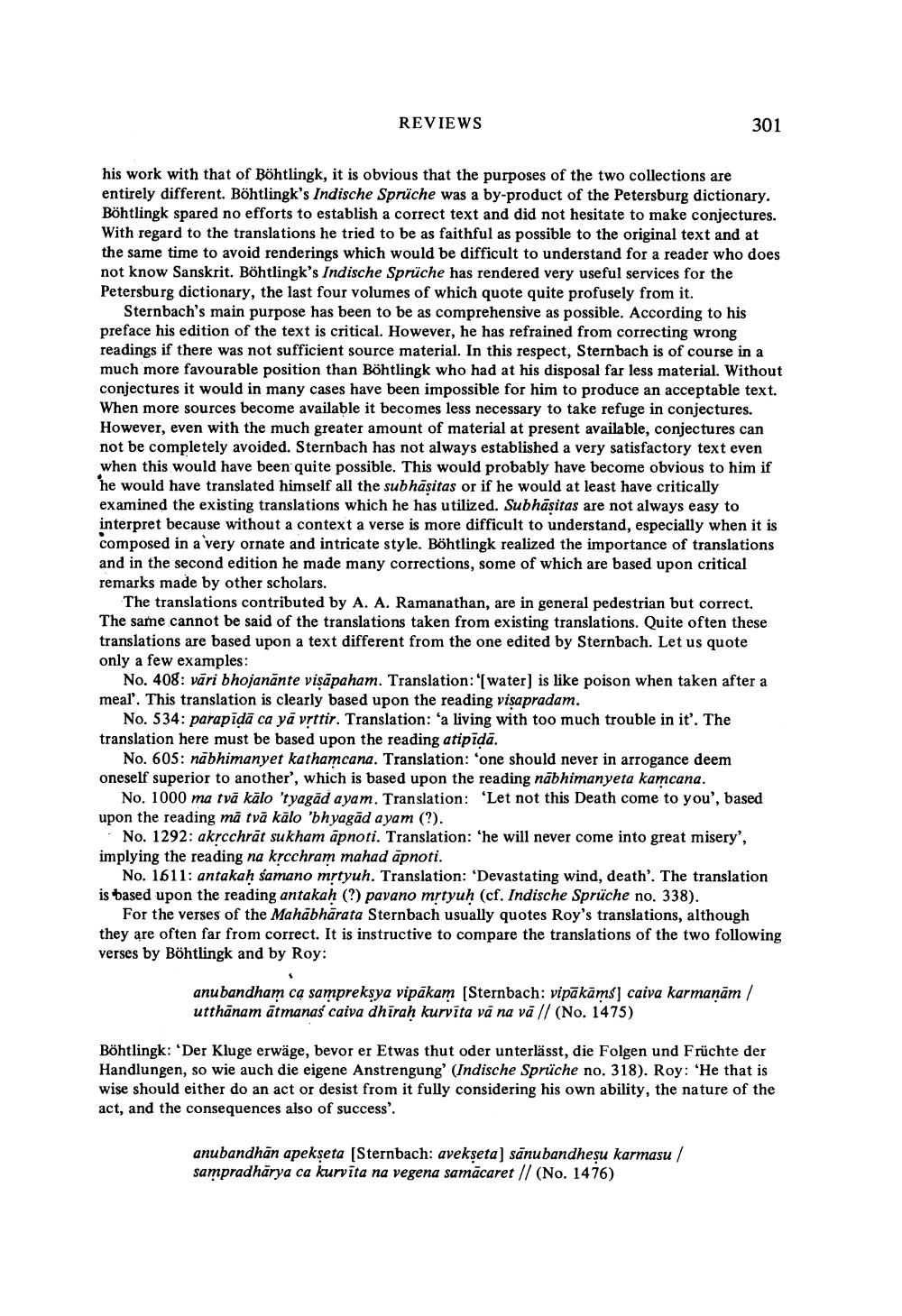Book Title: Reviews Of Different Books Author(s): J W De Jong Publisher: J W De Jong View full book textPage 5
________________ REVIEWS 301 his work with that of Böhtlingk, it is obvious that the purposes of the two collections are entirely different. Böhtlingk's Indische Sprüche was a by-product of the Petersburg dictionary. Böhtlingk spared no efforts to establish a correct text and did not hesitate to make conjectures. With regard to the translations he tried to be as faithful as possible to the original text and at the same time to avoid renderings which would be difficult to understand for a reader who does not know Sanskrit. Böhtlingk's Indische Sprüche has rendered very useful services for the Petersburg dictionary, the last four volumes of which quote quite profusely from it. Sternbach's main purpose has been to be as comprehensive as possible. According to his preface his edition of the text is critical. However, he has refrained from correcting wrong readings if there was not sufficient source material. In this respect, Sternbach is of course in a much more favourable position than Böhtlingk who had at his disposal far less material. Without conjectures it would in many cases have been impossible for him to produce an acceptable text. When more sources become available it becomes less necessary to take refuge in conjectures. However, even with the much greater amount of material at present available, conjectures can not be completely avoided. Sternbach has not always established a very satisfactory text even when this would have been quite possible. This would probably have become obvious to him if he would have translated himself all the subhasitas or if he would at least have critically examined the existing translations which he has utilized. Subhāsitas are not always easy to interpret because without a context a verse is more difficult to understand, especially when it is composed in a very ornate and intricate style. Böhtlingk realized the importance of translations and in the second edition he made many corrections, some of which are based upon critical remarks made by other scholars. The translations contributed by A. A. Ramanathan, are in general pedestrian but correct. The same cannot be said of the translations taken from existing translations. Quite often these translations are based upon a text different from the one edited by Sternbach. Let us quote only a few examples: No. 408: vāri bhojanānte visāpaham. Translation:'(water) is like poison when taken after a meal'. This translation is clearly based upon the reading visapradam. No. 534: parapidā ca yā vrttir. Translation: 'a living with too much trouble in it'. The translation here must be based upon the reading atipīdā. No. 605: nābhimanyet kathamcana. Translation: 'one should never in arrogance deem oneself superior to another', which is based upon the reading nābhimanyeta kamcana. No. 1000 ma tvā kālo 'tyagād ayam. Translation: 'Let not this Death come to you', based upon the reading mā tvā kālo 'bhyagad ayam (?). - No. 1292: akrcchrāt sukham apnoti. Translation: 'he will never come into great misery', implying the reading na krcchram mahad āpnoti. No. 1611: antakah samano mrtyuh. Translation: 'Devastating wind, death'. The translation is based upon the reading antakah (?) pavano mrtyuh (cf. Indische Sprüche no. 338). For the verses of the Mahabhārata Sternbach usually quotes Roy's translations, although they are often far from correct. It is instructive to compare the translations of the two following verses by Böhtlingk and by Roy: anubandham ca sampreksya vipākam (Sternbach: vipākāms caiva karmanām / utthānam ātmanas caiva dhirah kurvīta vā na vā // (No. 1475) Böhtlingk: 'Der Kluge erwäge, bevor er Etwas thut oder unterlässt, die Folgen und Früchte der Handlungen, so wie auch die eigene Anstrengung' (Indische Sprüche no. 318). Roy: 'He that is wise should either do an act or desist from it fully considering his own ability, the nature of the act, and the consequences also of success'. anubandhān apekṣeta (Sternbach: avekseta) sānubandheșu karmasu / sampradhārya ca kurvīta na vegena samācaret // (No. 1476)Page Navigation
1 ... 3 4 5 6 7 8 9 10 11 12 13 14 15 16 17 18 19 20 21 22 23 24 25 26 27 28 29 30 31 32
